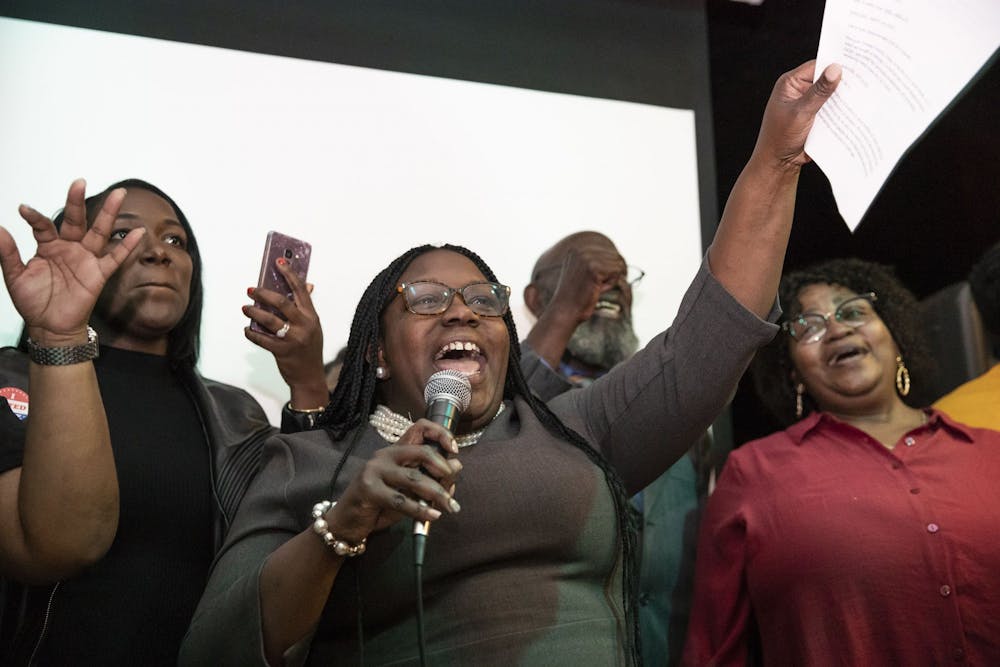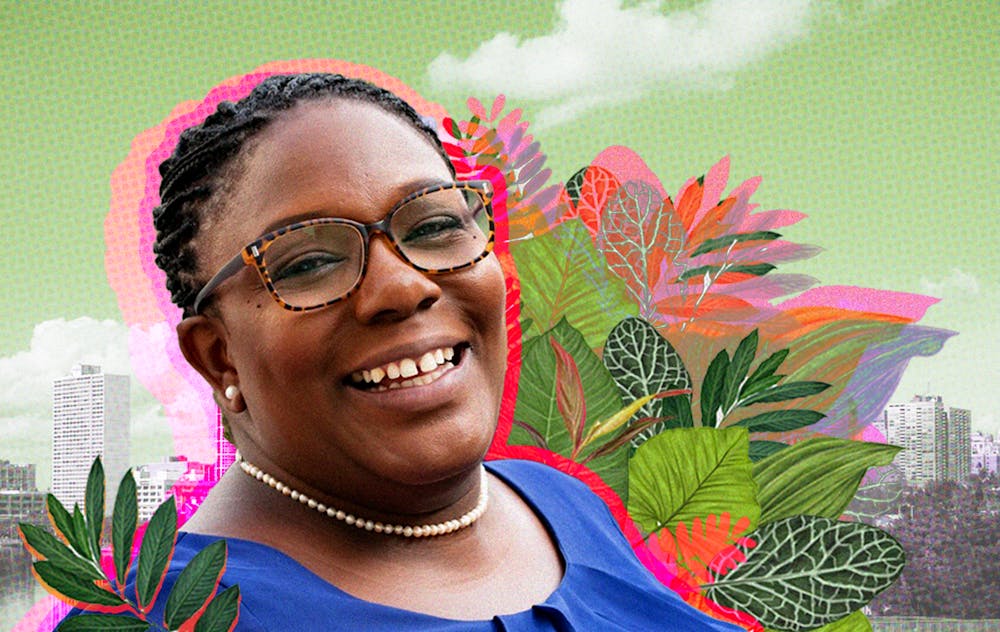In Philadelphia politics, there's little room for shakers and movers—that is, until Kendra Brooks made room for herself at the table.
In 2019, Brooks was elected to join 16 other members of Philadelphia’s City Council. Given Philadelphia’s status as a Democratic stronghold, the City Council is traditionally composed of mostly Democrats, and two of the at–large seats are reserved for a minority party, always going to Republicans. This is how the City Council operated dating back to the 1950s. But that all changed in 2019. Councilmember Brooks was the first third–party candidate to ever be elected to City Council, taking one of the two seats usually held for Republican councilmembers. Brooks ran her campaign as a candidate for the Working Families Party (WFP), a political party with a left–leaning and progressive platform.
With a reputation for grassroots organizing and campaigning, the WFP focuses on issues like labor rights, wealth inequality, and health care. Some elements of the party’s official platform include a national $15 minimum wage, free universal health care, and shifting resources from police departments to social services. The WFP has made waves in national politics following its affiliation with high–profile candidates like Rep. Jamaal Bowman (D–Yonkers) and Rep. Rashida Tlaib (D–Detroit). Councilmember Brooks’ election was unprecedented in Philadelphia politics considering the city’s notorious insider political culture. Philadelphia is often described as a large city with small–town politics, and who you know can determine whether or not you make it on the ballot, let alone win an election.
“A lot of folks that are in politics have been groomed and mentored in politics. City Council is like the next step in line for them,” Brooks says. But it wasn’t a next step for Brooks. In fact, running for elected office wasn’t even on her radar. “When I was offered the opportunity to run, I thought: if not me, then who?” she says.
Brooks was raised in Nicetown, Pa., a neighborhood in North Philadelphia. As a single teen mother, Brooks raised her four children in North Philly and still lives there today. Considering the unique set of challenges the neighborhood faces—such as high rates of poverty and joblessness—and the predominantly Black population in the community, Brooks says her personal background has shaped her tenure as a public servant. “I chose to run for office because I come from an underrepresented community. My life experiences and education have broadened my perspective on what it means to be a Philadelphian as a Black woman. I ran for office to make sure that the point of view and perspective of folks like me are represented on the City Council,” she says.
Brooks’ life experiences are also rooted in grassroots activism and community organizing. As a single parent, Brooks put herself through the Community College of Philadelphia (CCP) to become a nursing assistant. During her time in health care, she joined the membership of 1199C, a Philadelphia–based chapter of the National Union of Hospital & Health Care Employees. It was here where Brooks became acquainted with the labor movement and its importance to working families struggling to make ends meet. Her time as a 1199C member showed Brooks the need for workers to organize to demand fair compensation and safe working conditions. She learned that unions are the biggest tool that workers have to organize, and she continues to be a strong advocate for unionization. After CCP, she obtained an undergraduate degree from Temple University and an MBA from Eastern University.
For 17 years, Brooks also worked with a state–funded program called Easterseals, which connects families with community programs. Her work focused on helping children with disabilities enroll in summer programs and enrichment activities. But after Pennsylvania reduced its budget under former Gov. Tom Corbett, the program was defunded and Brooks lost her job. Without a steady source of income, Brooks lost her home in a sheriff sale, a public auction for a property that has been repossessed or defaulted on.
Around this time, Edward Steel School, the public school her children attended, was also being threatened with a takeover by a charter school operator. In response to this potential charter school takeover, Brooks founded Stand Up Nicetown and the Our City Our Schools coalition, two community organizations that have fought for local control of the School District of Philadelphia. Previously, the School Reform Commission, a Pennsylvania state–run body, decided whether or not Philadelphia public schools would be turned into charter schools. Brooks’ campaign was highly successful and ultimately led to the end of the commission, as well as an appointment by Mayor Jim Kenney to the Philadelphia school board nominating panel.
These difficult moments in Brooks’ personal life remind her every day of what she works for as a public figure. Maggie Hart, Councilmember Brooks’ communications director, says, “Having faced eviction herself and her children’s schools threatening to close, Councilmember Brooks is a strong proponent for workers’ rights, housing justice, and against [public] school privatization.” As a member of the 215 People’s Alliance Steering Committee, a diverse activist group fighting for equity in Philadelphia, Brooks was also a major contributor to the People’s Platform, a set of progressive policies that address issues ranging from environmental cleanup in public schools to criminal justice reform.

In regard to her progressive policies, Councilmember Brooks acknowledges there's occasional reluctance from her colleagues. “As the progressive movement gains momentum across electoral politics across the country, it's going to scare some more conservative Democrats. But the reality is that’s how good laws are made—varied perspectives that reflect the interests of all Philadelphians,” Brooks says. The most recent piece of legislation that Brooks has introduced in City Council has gained media attention for its “radical” proposition. That legislation, called the Philadelphia Wealth Tax, establishes a maximum 0.4 percent tax on all direct holdings on stocks and bonds for Philadelphians. The bill has garnered support from other progressive political figures including fellow Philadelphia Councilmembers Helen Gym and Jamie Gauthier, as well as Sen. Elizabeth Warren (D–Mass.). According to a document that Brooks’ office has circulated to the press, the bill will “tax individuals who have seen unprecedented profits over the course of the pandemic.” The document notes that the bill will primarily affect the top quintile of wealth holders in Philadelphia, pointing out that direct holdings in the stock market are “concentrated among the wealthiest Americans, who are predominantly white.”
Brooks and her team have touted the need for the bill to fund Philadelphia’s crumbling social safety net. This includes mobile response units for mental health crises, funding public libraries, youth programming at recreation centers, and homeless services for housing–insecure senior citizens. The bill has received some initial pushback from more conservative leaders who claim the tax will deter wealthy Americans from investing in Philadelphia and urge the city to make better use of its existing funding.
Kendra Brooks’ story should be a wake–up call for career politicians. Her progressive, social safety net–focused policies are part of a larger national progressive movement that has gained steam over the last few election cycles. Progressive politicians like Sen. Bernie Sanders (I–Vt.), for instance, have captured national attention even when they've failed to win consequential elections. Kendra Brooks, far from a career politician, has lived through the issues she writes legislation for. Through her background in local activism, Brooks has been impacting the lives of communities that are often neglected and whose needs are rarely prioritized. Her rise to City Council as a third–party candidate is a sign that Philadelphians want politicians that are aware of their issues and have a stake in the community—breaking through long legacies of precedent in the process.
Brooks is still a relatively new presence in the world of Philadelphia politics, but she likely has a long career ahead of her to enact influential change. As for her own vision for the city, Brooks remains hopeful. “I have to keep a level of optimism to believe that all the work that I'm doing is not in vain. It's building a better city for my children and the children of other Philadelphians in my generation and those to come,” she says. And for young Philadelphians, Brooks has a special message: “We need young, motivated, progressive people to get involved in politics in order for us to build something that works for everyone. But we need generations of young folks to get involved and be consistent,” she says.
Ed. note: A previous version of this article quoted Hart as referring to "prep school privatization," which we later determined to be misspoken. The quote has been updated to reflect Hart's intended meaning.

